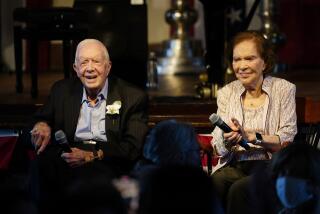‘Too Many Americans Still Die Alone’
- Share via
I’ve been a hospice nurse here in Southern California for five years, and I can’t count the times people have asked me how I do it. They assume it’s depressing, without hope and demoralizing to the point of certain burnout. In fact, nothing could be further from the truth.
Hospice is a job that allows me to be an educator, clinician, marketer and confidant. It’s unfortunate that when many people hear about hospice, they think of a depressing end. I like to point out that they can also see it as the beginning of comfort and quality of life.
The availability of hospice care is a blessing that is truly worth celebrating. Something that many Americans don’t know is that it is their free benefit through Medicare for those aged 65 and over. For those younger than 65, it’s a benefit through MediCal or their insurance provider.
I have been involved in many fields of nursing. I’ve also been a full-time hospice nurse and have never felt more fulfilled, more needed and more appreciated.
Hospice care is provided at the discretion and direction of the patient and family, in the setting of their choice. They call the shots, and we do our best to answer their needs on their terms.
Hospice is provided by a team that includes not only the family but professionals from medical, social and spiritual disciplines. The members of that carefully integrated team blend their expertise to meet all of the patient’s needs.
Hospice caregivers are experts in pain management. While most traditional health care professionals are trained to treat pain as an afterthought to surgery, hospice caregivers focus directly on the pain itself.
Once we get the pain under control, we can help patients deal with other crucial end-of-life issues.
No one should have to die alone, and with hospice care they won’t. We include the family in everything we do, and patients can call a hospice caregiver to their side 24 hours a day.
While the medical members of our team address pain, trained social workers and chaplains determine what the patient and family want to accomplish during this final stage of life.
Many patients want to make certain that funeral arrangements are made. Others are concerned about unresolved family issues. Many find comfort in writing journals or making videotapes and audiotapes for loved ones. Social workers can even address the needs of patients no longer able to talk by asking yes and no questions that can be answered by blinking eyes.
Hospice care is the most compassionate care available for terminally ill patients, enabling them to experience a meaningful final phase of life. Yet too many Americans still die alone and in pain--either through ignorance of hospice and its benefits or because they’re referred too late.


